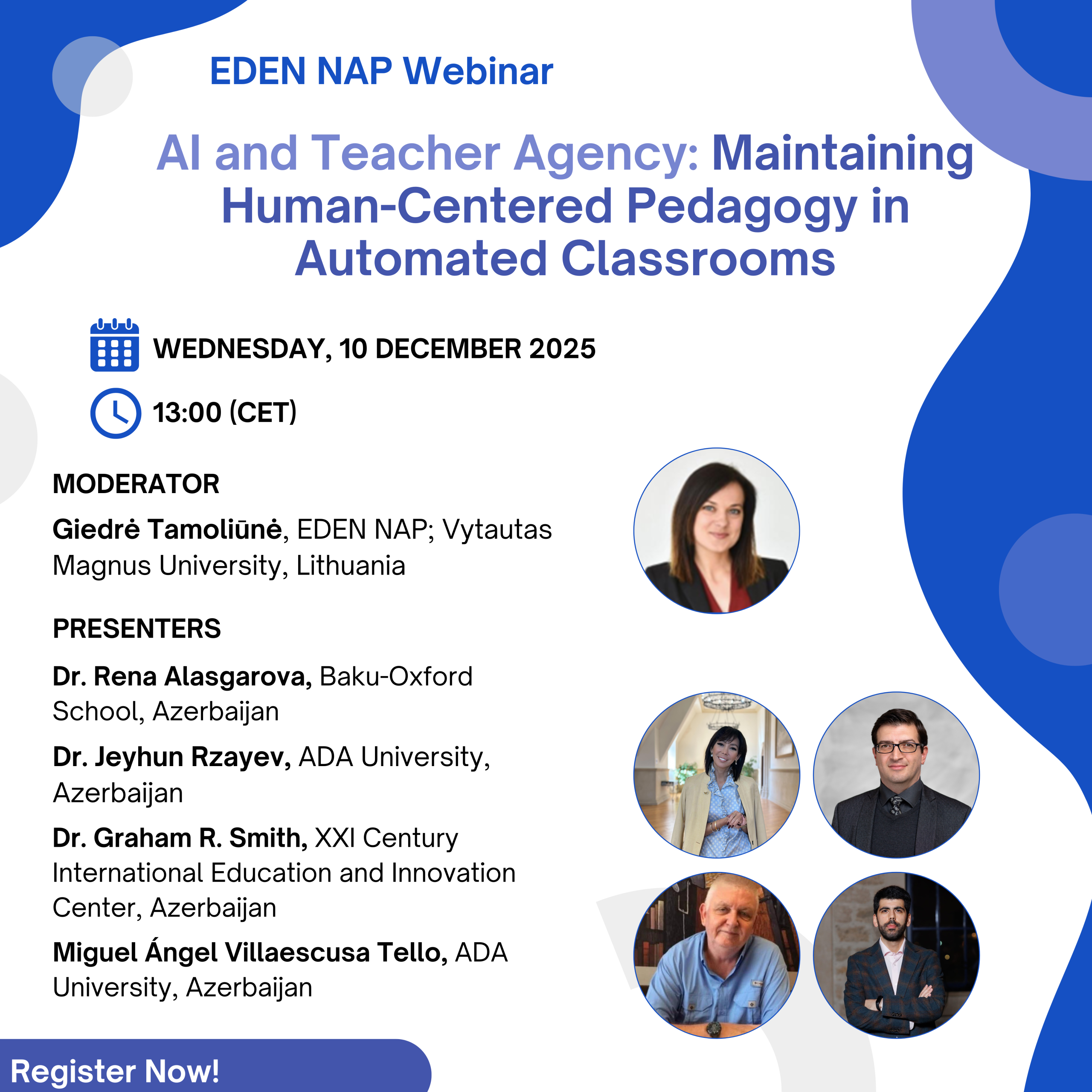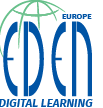
- This event has passed.

EDEN NAP Webinar – AI and Teacher Agency: Maintaining Human-Centered Pedagogy in Automated Classrooms, December 10 at 13:00 CET
December 10, 2025 @ 13:00 – 14:30
As artificial intelligence becomes more present in classrooms, questions arise about how to preserve the central role of teachers in shaping learning. This webinar examines how AI tools can support or challenge teacher agency and student engagement. Presenters will reflect on the risks of over-automation, the importance of human judgment, and strategies for maintaining human-centered pedagogy in an AI-driven era. The session will invite discussion on how educators can integrate AI critically and ethically while ensuring that meaningful teacher-student relationships remain at the heart of education.
This webinar focused on the critical aspects of digital well-being within the European education ecosystem, exploring research, policies, and practical strategies to create healthier, more balanced, and ultimately more effective digital learning experiences.
Type of session: presentations with discussion
Duration: 90 minutes
Moderator

Dr. Giedrė Tamoliūnė is an associate professor and researcher at Education Academy, Vytautas Magnus University, involved in European and national scientific and applied projects that focus on different aspects of technology-enhanced teaching and learning, e.g., DI-daktika, WINDEE (Digital Wellbeing, AI Pioneers. Her research interests focus on technology-enhanced teaching and learning in higher education, lifelong learning, open education, and adult education. For the last several years, she has actively researched learning analytics for teaching and learning, micro-credentials, and digital assessment. She has been a Deputy Chair of the Steering Committee for the EDEN Network of Academics and Professionals (NAP) since 2023.
Presenters
Dr. Rena Alasgarova is the Deputy Academic Head for Secondary School at Baku Oxford School, Azerbaijan, and an adjunct professor at ADA University. She holds a BA in English Language Philology, an MA in TESOL, and a PhD in International Leadership. She is currently pursuing a second PhD in General Linguistics at Charles University in Prague, focusing on bilingual students. With extensive experience in education, Dr. Alasgarova has presented at global conferences and published influential work on AI in Education (AIED). Her research and professional work include developing AIED training programs, exploring AI applications in teaching and learning, and advancing sustainable development in the education sector. She also designed and currently teaches Azerbaijan’s first master’s course on the Ethical and Practical Use of AIED at ADA University. Beyond implementation, her scholarship examines how societies perceive AI through a cultural lens. She is co-editor of the Public Humanities special issue “AI and Cultural Identity,” and she investigates AI ethics, human agency, and model explainability (XAI) to promote responsible, culturally attuned adoption of AI.
Dr. Jeyhun Rzayev is a cultural anthropologist with a historical background. He earned his Ph.D. in 2014 and is currently an Assistant Professor and lecturer in the School of General Education at ADA University, Baku, Azerbaijan. His research explores higher education and its role in the social and cultural development of Azerbaijan, and he also works on issues of cultural heritage. Most recently, he investigates the cultural perception of artificial intelligence: he is co-editor of the Public Humanities special issue “AI and Cultural Identity,” and he leads several AI in Education (AIED) projects examining how AI reshapes critical thinking, creativity, and learning practices in higher-education settings.
Dr Graham R. Smith is an English Language and Literature teacher with a unique academic and creative background. Holding a PhD in Computer Science, he brings analytical depth to the humanities, blending technology and literature in innovative ways. His current work focuses on Cambridge IGCSE English as a Second Language (0511) and Literature in English (0475), where he emphasizes critical thinking, creativity, and exam-focused clarity. Beyond the classroom, Graham is a published poet with a passion for exploring the voice of the 21st century through verse. His research interests lie in teacher agency and the role of AI in teaching and learning, with a particular focus on how technology can amplify, rather than replace, the professional judgment of educators.
Miguel Ángel Villaescusa Tello is the Spanish Language Lecturer at ADA University (Baku, Azerbaijan) under the Spanish Agency for International Development Cooperation (AECID). His research focuses on language education, intercultural communication, CEFR-based curriculum design, and the integration of artificial intelligence in linguistics and language learning pedagogy. As an educator working across diverse technological and cultural contexts, Miguel has studied and worked in Spain, the US, Russia, Romania, and Azerbaijan, gaining extensive international experience. In 2025, he has taken part in JEFE-Vi (Vienna Conference on Spanish for Specific Purposes) and the 8th International Education Conference at ADA University. At these conferences, he presented “La diversidad cultural del mundo de habla hispana en el aula de ELE: oportunidades y desafíos de una enseñanza intercultural” and “Spanish for Global Impact: Education Beyond the Classroom,” both of which are currently being developed into full research articles.
